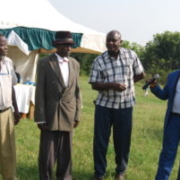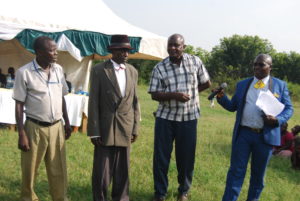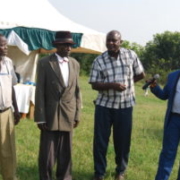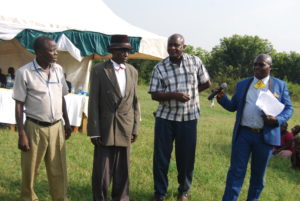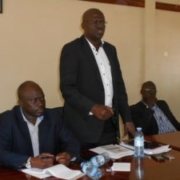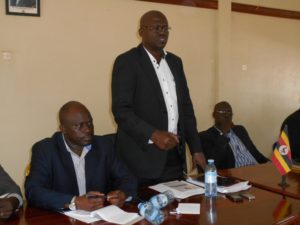Fuel Theft Derails Oil Roads Construction
KIKUUBE – A steep rise in the theft of cement and hundreds of litres of fuel from Chinese road contractor; China Railway Seventh Group (CRSG) threatens to derail completion of the on-going construction of the Shs 500 billion ,97 kilometer, oil roads project in the Albertine Graben region.
In 2018, the government contracted China Railway Seventh Group (CRSG) to tarmac the 25 kilometer Hohwa-Nyairongo-Kyarushesha-Butole Road, Kabaale-Kizirabfumbi road (25kms) and the 47 kilometer Masindi-Biiso road.
Overwhelmed by the persistent fuel thefts, an CRSG official recently petitioned Kikuube Resident District Commissioner Amlan Tumusime to intervene and stop the escalating vice.
Ambrose Atwine, the company spokesperson, said CRSG is overwhelmed by the problem.
According to information from CRSG, the company loses about 4,500 litres of fuel worth over Shs 162 million to fuel thieves per month, which translates to over Shs 1.3 billion every year.
Charles Muhangi, a maize farmer and cattle keeper in Kyarushesha village in Kyangwali sub-county, said security must intervene and stop the fuel theft.
https://thecooperator.news/market-vendors-tipped-on-sacco-formation/
“We farmers have suffered with poor roads for a long time. It has been very difficult to transport our produce from here to the markets, so when we hear someone sabotaging the construction of these roads, we get concerned because they mean a lot to us,” he said.
RDC Amlan Tumusime said stealing road construction materials was becoming a serious challenge to government projects.
He said government officials including police officers were involved in the theft.
Tumusime said they are investigating several police officers implicated in the theft.
“Several police officers who have been singled will soon have tough measures taken against them and they have started recording statements” he said, adding that the suspected officers have been conniving with truck drivers to siphon fuel from CRSG trucks and sell it in jerrycans.
Fuel thieves connive with company truck drivers to siphon fuel from trucks. The stolen fuel is sold in Hoima, Masindi and Kampala.
Tumusime said spy networks have helped pin down the suspects.
Speaking to theCooperator last Monday, Tumusime said over 10 thugs were arrested, produced in courts of law, charged and remanded last month.
He said the district has managed to impound two vehicles used by thieves to transport the stolen fuel last month and this month.
Vehicle registration number UAD 189K Toyota Corona and Premio registration number UAS 609N were impounded in an impromptu security operation.
The culprits allegedly fled and abandoned the vehicles when security stormed. The vehicles are currently parked at Kikuube central police station.
He said over 10 jerrycans of siphoned fuel, 10 drums and a pipe used to siphon the fuel were also impounded during the operation.
“We first sensitized the community and educated them that these projects benefit them and not the Chinese. I am very happy that the community was empowered and whenever they see anybody stealing fuel, they call us and this has helped us to curb this challenge,” he said.
Buy your copy of theCooperator magazine from one of our countrywide vending points or an e-copy on emag.thecooperator.news
The post Fuel Theft Derails Oil Roads Construction appeared first on The Cooperator News.

